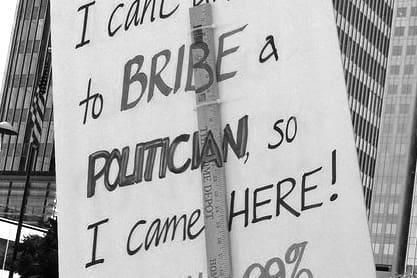Colombian journalist Jineth Bedoya was recently named laureate of the 2020 UNESCO/Guillermo Cano World Press Freedom Prize. In the year 2000 she was subject to kidnapping, torture and sexual violence while covering a case of corruption and human rights violations in prisons. Now, twenty years later, the troublesome environment for media freedom in most of Latin America remains the same and journalists operating in the region face the same dangers.
Just like Bedoya, other journalists who denounce human rights violations and cases of corruption in Latin America are subject to a variety of horrors by authorities who want to censor them. Reports by the Inter American Commission on Human Rights (IACHR) highlight that journalists have been essential in the fight against corruption, but violence against them is intensifying due to this. According to Reporters without Borders’ 2020 press freedom index, those who cover sensitive subjects have experienced an increase in violence and intimidation.
The corruption of authorities is commonplace in Latin America and although a huge number of people suffer because of it, many are afraid to denounce those in power. According to Transparency International’s Global Corruption Barometer:
- more than one in five members of the general public who required access to public services such as healthcare were forced to pay a bribe
- one in four were offered bribes in exchange for votes
- nearly three in four believe they will suffer retaliation.
The IACHR has said that impact of corruption on human rights is severe, as it hinders the governments’ capacity to provide vital services and diverts critical resources for both vulnerable groups and society in general.
The same report from Transparency International also shows that almost 77% of the general public think they can make a difference in the fight against corruption. This was seen in 2019, when inequality, corruption and the weaknesses of democratic institutions led thousands of people took to the streets in protest.
However, the Covid-19 pandemic has of course had an effect on people’s ability to protest in the traditional sense, and in turn seems to have put meeting the public’s demands on pause. An example of this is the postponement of the Chilean constitutional referendum from the 26th April to the 25th October, which intended to address the citizen discontent.
Inequality and corruption persists through the pandemic and has an adverse effect on peoples’ lives. One of the most horrifying examples is that of Ecuador, where services have become so overwhelmed that hundreds of bodies have been left unburied and in some cases have even been left on the street.
Another is in Colombia, where people are hanging red clothing and flags from their buildings to alert others that they are starving to death. Allegations of corruption in the spending of government funds to address the pandemic have been made in Colombia as well as like Argentina and Brazil.
Governmental restrictions against freedom of expression and journalism have a direct effect on journalist’s capacity to shed light on these issues. There have been reports of several types of restrictions connected to the coverage of Covid-19 in Bolivia, Paraguay, Mexico, Venezuela, El Salvador, Guatemala and Honduras. This includes public access to information or press conferences, arrests, enactment of severe laws punishing ‘misinformation’ as an excuse to stifle criticism; or the adoption of derogations to human rights treaties.
The media has always played a key role in exposing these abuses and their work is even more crucial during this time.
The UN Special Rapporteur on the promotion and protection of the right to freedom of opinion and expression recently highlighted that governments have to protect and promote the work of journalists, as well as “enabling them to continue their work, including, where appropriate, by classifying it as essential”. These recommendations are critical in regions uch as Latin America, where there has been repeated violence against the press.
The pandemic has made governments’ deficiencies more evident. Journalists have the right to address this publicly.
If you are in need of legal assistance, please click here.
If you would like to help our organisation through providing pro bono legal support, please click here.
If you would like to be part of our effort to defend media freedom by donating, please click here.
For a Spanish version of this article please click here.
Recent News
World Press Freedom Day Side Event: Profiling and surveillance, a renewed challenge to freedom of expression
From May 2-4 2024, UNESCO and the government of Chile will host the 31st edition of World Press Freedom Day in Santiago. The global commemorative conference commemorates the vital role of journalism and information access in fostering a sustainable future that upholds diversity of voices. Media Defence is organising a side event at the conference […]
Landmark Ruling: Kenya’s High Court Declares Colonial-era Subversion Laws Unconstitutional
Media Defence welcomes the verdict of the High Court in Nakuru, striking down sections of the Kenyan Penal Code which criminalise subversion, citing them as relics of colonial oppression that curtail freedom of expression. Justice Samwel Mohochi, delivering the judgment, asserted that these provisions were overly broad and vague, stifling dissent rather than serving any […]
UN Rapporteurs Call for Protection of Brazilian Journalist Schirlei Alves
UN Rapporteurs Call for Protection of Brazilian Journalist Schirlei Alves Amid Defamation Charges Stemming from Rape Trial Coverage A letter dispatched by UN rapporteurs to the Brazilian Government calls for protective measures for women journalists covering cases of sexual crimes. The letter also denounces the conviction of Brazilian investigative journalist and women’s rights defender, Schirlei […]



